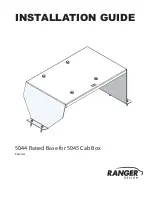
11
Lights Do Not Turn Off
1. Check that the Time control
dial on the bottom of the sensor
is set to minimum.
2. Stay completely out of the
protection pattern to avoid activating.
3. Make sure unit is not mounted
on an unstable object (tree or
pole) that sways in the wind. Make
sure unit is firmly mounted.
4. Make sure unit is not aimed at
something that would cause a
temperature change such as tree
branches, a body of water, air
conditioners or heating vents.
5. Make sure unit is not in “Manual
Override” Mode. Turn power off for
more than 5 seconds, then back
on again to resume automatic
operation.
6. Make sure line voltage has not
”browned out” to below 100 volts.
This might happen if installation is
on a day with heavy air conditioner
use. If voltage is not adequate,
wait for voltage to recover to normal.
Lights Turn On In Storm
Rain, snow and windstorms can
create large temperature changes
which may turn on the sensor.
False triggering can be minimized
by installing the sensor in a
protected location and turning
down the sensitivity control.
Maintenance and Repair
Keep the lens area clean and free
of obstructions. Do not attempt to
open or repair the unit. There are
dangerous voltages inside and no
user serviceable parts. For repair
service follow your warranty.
Each Gotcha undergoes rigorous
testing and quality control proce-
dures before it leaves the factory.
Malfunctions are most often due
to incorrect installation or aiming
of the unit.
Lights Do Not Turn On
1. Turn off power for at least 5
seconds, then on again. Remember
the daylight test period is only 5
minutes long.
2. Check that bulbs and fixtures
work. Compare wiring to the wiring
diagram. Check that power is on.
3. Check that sensor is level from
side to side and pointed at the area
you desire. Sensor should be pointed
slightly downward.
Lights Go On and Off Quickly
1. Make sure sensor is located below
and in front of the lights.
Heat from the lights will cause
unsteady sensor performance.
2. Make sure lights are not reflecting
back into the sensor. Check for white
or reflective
surfaces in the protection pattern.
Aim sensor and lights in different
directions.
3. Note that the sensor is more sen-
sitive in winter since infrared energy
is easier for the sensor to detect in
cold temperatures.
4. See #3 & #4 of “Lights Do Not
Turn Off.”
Troubleshooting






























